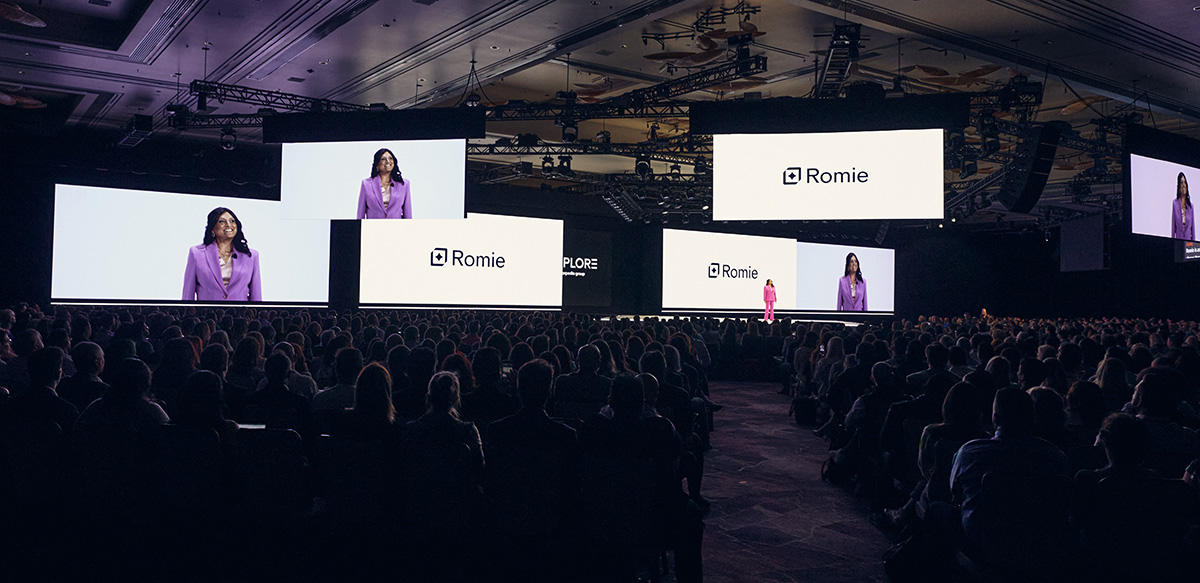Emotional marketing, speedy AI-powered searches and creator content top highlights at EXPLORE 24

Emotional marketing, speedy AI-powered searches and creator content top highlights at EXPLORE 24
EXPLORE, Expedia’s annual partner conference, reached a milestone this year with its 25th installment. It was also Expedia’s first flagship event in two years, albeit having held pocket events in key markets worldwide during the hiatus.
Emanating from the Aria Resort and Casino in Las Vegas, this year’s conference was bolstered by ramped-up production and the overarching theme of ‘Artificial Intelligence and Gen AI’. There was a palpable feeling of change in the air – partly because of new tech but mainly because Expedia had a new CEO in Ariane Gorin, who had officially taken on the role less than 48 hours prior to the conference.
The announcement of Gorin succeeding former CEO, Peter Kern, was announced in February this year. Following that, Expedia Group appointed Alfonso Paredes as President of Private Label Solutions and Greg Schulze as President of Travel Partners and Media, creating two new operating divisions within the company.
The need for speed
‘Speed’ seemed to be the name of the game behind many of Expedia’s tech-driven decisions this year. During a media conference, Gorin, as newly appointed CEO, said the way Expedia Group applied tech is to support the idea of “less time searching and more time finding a great match”.
(From left) Lauri Metrose, Senior Vice President, Global Communications, moderating a media conference with Ariane Gorin, CEO, Expedia Group and Rathi Murthy CTO and President, Product & Technology at EXPLORE 24
This is true with the launch of the company’s chief product at EXPLORE – Romie. An AI assistant that can be enabled to work with third-party apps like WhatsApp and other messaging platforms, Romie ‘listens’, learns and plans trips in the background based on customers’ chat messages, cutting down the process of manually searching for flights and hotels afterwards. The product is now in alpha and available only in English, in the US, with expanded rollouts coming soon.
On the subject of AI hallucinations – a phenomenon where a large language model (LLM) perceives patterns or objects that are nonexistent, creating nonsensical or inaccurate outputs – Rathi Murthy CTO and President, Product & Technology, said “We’ve been working with Gen AI for quite a while now. We’ve built a strong practice around AI governance and have had a lot of practice to protect against hallucinations or responses that are irrelevant to Expedia Group or travel.”
“That being said,” continued Murthy, “The nature of AI is a progressively learning journey. Our teams are constantly watching, we have a framework that enables us to respond to [unexpected responses] in a timely manner.”
Both Gorin and Murthy supported the “power of a unified [Expedia] platform” during their chat with the media, emphasising that it would “reduce the time it takes to search properties, make smart shopping faster, create reviews faster and enhance personalisation.”
This is equally true in Expedia Group’s B2B channels with the release of Rapid API, a relatively new product for the company’s partners with ‘speed’ baked into the title.
Travel begins before travel begins
Amanda Rantuccio, Global Vice President, Brand Marketing, shared a few results from a recent survey – 55% of travellers don’t have a destination in mind even when they’ve decided to travel, and the average traveller views 141 pages of content before booking a trip.
Expedia Group is evidently big on storytelling and soft marketing this year. The company’s opening video at EXPLORE touted the idea that travel begins the moment one is tempted to travel, suggesting that imagining, budgeting, planning and discussing a trip way before it happens are all part of the journey.
The goal, according to Rantuccio, is to position brands – OTAs, service providers, flights, hotels and tours and attractions – at all points of the traveller booking journey, starting at the moment of ideation.
Japan is a market that Expedia Group is putting a serious focus on this year, with a new marketing campaign in-line with its pivot to emotional, soft marketing. Static and dynamic ads were placed in busy spots in Japanese cities, showing moments of respite or relaxation as a juxtaposition against the hustle and bustle of the daily city grind.
Expedia data shows the number of searches for ‘Tokyo’ on its platform increased by around 55% for two years in a row, and they estimated that 48% of travellers from U.S. to Japan booked their travels on Expedia.
Chandreyi Davis, Vice President, Brand Marketing, said, “Brands CANNOT be overly transactional. That’s where stories come in.” Meanwhile, Indiana Matine, Head of Brand Strategy, explained that “60% of travellers surveyed look to OTAs to provide inspiration and discovery.”
“When creating ads”, Matine said it’s pivotal to know “What problem you’re trying to solve – is it a business problem or a travel problem?”
“For Canada, we leveraged a celebrity, we did something that was really talkable, we did something that our PR team can amplify and talk about and repurpose. Know your audience and what connects with them.
“The more you can get under the skin of the person you’re trying to address, the more you can create powerful stories.”
Sustainability is as busy as ever behind-the-scenes, but not marketed as much
While the mentions of ‘sustainability’ may not be front-and-center these days compared to a couple of years ago – partly because of AI’s all-encompassing effect – work on sustainability products and practices seems to be happening just as much, or more, behind the scenes.
Speaking to WiT, Aditi Mohapatra, Vice President, Global Social Impact & Sustainability, said, “In travel, I’m not sure that it is [quieter]. We launched our first Climate Action Plan in September last year, where we set out our long-term and short-term goals and vision for addressing sustainability throughout the travel industry. We’ve stepped up our commitments in this space.”
“About two and a half years ago, we launched our vision for where we wanted to be headed and we’ve been demonstrating that with a number of programs and initiatives and new goals in this space,” continued Mohapatra.
“So, for us, we’ve seen a ton of action and if I look across the industry, it may not be on the front of every marketing effort, although I’ve seen some great marketing efforts on sustainability, but the action is continuing to advance. We’ve seen airlines take sustainability seriously with large multi-year, multimillion dollar investments in this space. Hotel chains continue to get all of their properties certified, which is no small feat in a franchised industry. We’re seeing destination partners take on considerations in sustainability and how they’re managing their location because they’re feeling the impacts of climate change as well.
“We’re hearing about it from our partners on the regular as well. A lot of our work is partner-facing and we’re seeing them respond to the work that we’re putting out there as well. It’s an indication of demand and interest for us.”
Crowdsourced content is an undeniable marketing asset
During a session on ‘storytelling through integrated marketing’, Rantuccio, emphasised that ⅗ of travellers surveyed use social media for inspiration when deciding where to go next.Meanwhile, Davis shared that according to Semrush research, traditional advertising will reduce by 25% in the US over the next 3 years.
The recognition of the changing face of advertising was apparent at EXPLORE, with more brands and expedia themselves moving away from overly transactional target marketing to emotion-based campaigns with relatable stories.
With social media and influencer content having significant influence on traveller behaviour, Expedia Group also announced the launch of Travel Shops at EXPLORE – a creator-driven storefront akin to Amazon that, once it’s fully open to the public, will allow anyone to make their travel recommendations completely shoppable.
Jochen Koedijk, CMO of Expedia Group, described Travel Shops as “a first-of-its-kind travel platform that bridges the gap between content creators and travellers, creating a central hub for curated travel recommendations and a seamless shopping experience.”
Murthy explained that Expedia Group is gathering feedback from its panel of brand ambassadors, including Oneika Raymond, Founder, OR Media and Brett Conti, Founder of Brett Conti, to finetune the product.
While Travel Shops is now online and has 14 creators in the initial phase, starting Q3 2024, the platform will be open to the public. Once in that stage, commissions for creators will be an option.
It takes human intelligence to understand where and how to apply Artificial Intelligence
While AI and Gen AI are hot topics that have permeated every conversation in the industry (the breakout sessions at EXPLORE on AI were packed to the brim), a number of channels within Expedia Group’s network were quite confident in not needing to replace current systems with something overly AI-based.
New chief of Private Label Solutions, Paredes, emphatically said that while the company is proud of its AI assistant, Romie, it won’t replace travel agency products (referring to TAAP – Travel Agent Affiliate Program) or other private label solutions that are working well for Expedia’s partners.

The launch of Romie, Expedia’s new AI assistant, at EXPLORE 24
“When we build something at Expedia, we build it in a way that can be transferred to a white label, even Romie,” continued Paredes. “What we do at private label solutions is very intentional. We’ve been on the same mission for years; you don’t get to our numbers without being that way.”
Schulze supported Paredes’ outlook by saying, “Even the most advanced tech thrives with the human touch, especially in an industry built around hospitality.” “We’re extending into a more traditional retail network to find travellers who want to work with us, by leveraging technology,” he added.
Gorin herself said, “AI does not create magic, you need human intelligence to know where to use it and how to use it.”



